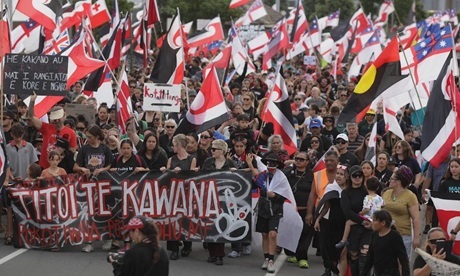Common thinking on the contentious Treaty Principles Bill has healed a decades-long rift between the Anglican Church in Wellington and Ngāti Toa Rangatira.
The Church and iwi have joined forces to “unequivocally” oppose the Bill which they say reinterprets the 184-year old Te Tiriti o Waitangi – the Treaty of Waitangi.
The Bill, which sets out proposed principles of the Treaty of Waitangi in legislation, is repeating historic mistakes the Church and iwi say.
On Thursday, Parliament was suspended briefly during the Bill’s first reading as Māori MPs staged a haka to disrupt the vote.
Once order was restored, the Bill passed its first reading and will be voted on again next year.
It is not expected to go through a second reading as National and NZ First say they will not support it beyond the first.
Rewriting a sacred covenant
The Bishop of Wellington Justin Duckworth and Assistant Bishop of Wellington Anashuya Fletcher said “For us, the Treaty is a sacred covenant”.
The Bill’s misinterpretation of the Treaty between the British Crown and Indigenous Maori undermines “this sacred covenant” and diminishes “the mana of our forebears and all parties who signed it”.
They agree the Treaty Principles Bill “has echoes” of a far-reaching judgement which the long-dead supreme court judge Sir James Prendergast made in 1877 concerning the Treaty, Ngati Toa and the Anglican Church.
The rift, the judgement and the Treaty
The 176-year rift between the Church and iwi had its roots in 1848, when Ngāti Toa gifted land in Porirua to the Anglican Church.
In return, the Church promised to build a school for the iwi’s rangatahi (young people).
No school was built. Later, the Church received a Crown grant to the land without Ngāti Toa’s consent.
Offended Ngāti Toa chief and Executive Council member Wī Parata took the church to the Supreme Court in 1877.
The judges dismissed the case.
The Chief Justice of the day, Sir James Prendergast, in his ruling called the Treaty of Waitangi a “simple nullity” and “worthless”.
It couldn’t be of value because it was signed “between a civilised nation and a group of savages” he claimed.
“The dismissal of Te Tiriti o Waitangi in this landmark case was a grievous error that disregarded the sovereignty guaranteed to Māori under Te Tiriti” said Dr Taku Parai, Ngāti Toa’s Pou Tikanga.
The King’s Counsel oppose the Bill
The Anglican Church and Ngati Toa’s joint statement joins a chorus of opposition against the Bill, including a many thousands-strong hikoi that will arrive at Parliament grounds today.
Those on the hikoi are bringing with them a letter signed by 42 of the country’s prominent King’s Counsel.
The letter calls the Bill an attempt to rewrite the Treaty.
It will effectively unilaterally change Te Tiriti and its effect in law without the agreement of Māori as the Treaty partner, the King’s Counsel say.
Source
